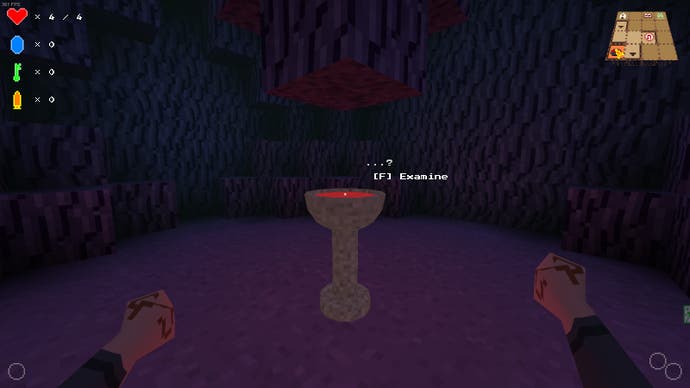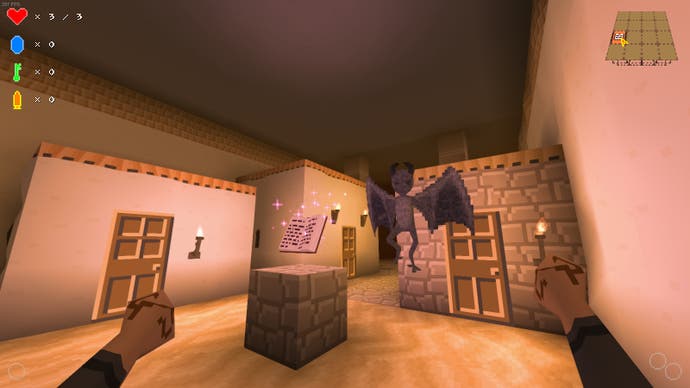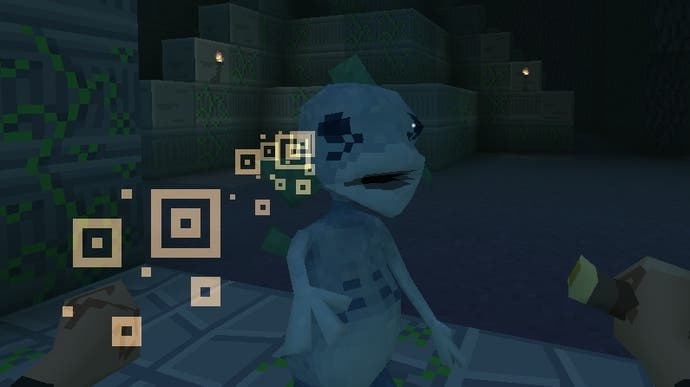More games need their own rooms full of blood
On history and mystery.
Here's something magical and strange: a vast, perhaps endless world of glorious horrors, stuffed into a teeny tiny space.
To put it another way, I discovered, when re-downloading Eldritch last week, that it all fits into a file that's just slightly larger than 40MB. It seems impossible really - the kind of infernal geometry that HP Lovecraft himself would have lost sleep over. But it's the truth, all of Eldritch - all of Eldritch Reanimated - in a file so small it could have been an XBLA launch title.
Eldritch Reanimated is the reason why I was re-downloading Eldritch, as it happens. David Pittman's blocky Lovecraftian roguelite has always been a generous delight, sending you out into caverns measureless to man to fight unthinkable star-heads and giant penguins, but Reanimated gives everything a quick updating entirely for free. There's under-the-hood stuff and performance improvements, naturally. I would not understand the nature of these things even if I took a year of tech courses at Miskatonic University. But there's also just new stuff. A new power, new weapons and tools and monsters. And new rooms!
These rooms are what's gotten me truly excited. On Twitter - I read about it on RPS - Pittman admitted to a strange conversation he'd had with an Eldritch player who had stumbled across a room fitted with a pool of blood. What did it do, the player wanted to know. Whatever it was, they couldn't get it to work.

This is the thrilling bit. Rather than explain everything, Pittman admitted that it had been a while since he'd made the room, and he couldn't actually remember what it did anymore. "I could look it up now," he said, "but it's more exciting that it's a mystery to me too!"
That word. Mystery. I started playing games in the 1980s, and mystery was such a huge part of the appeal. These games were filled with dark spaces - platforms that floated against nothing, loading screens that left huge gaps on the screen as an image was slowly drawn into life - and they were filled with strange bugs and glitches, as well as rules that weren't properly explained, transitions that didn't make sense, animations that were hard to interpret. These mysteries seemed unsolvable. The idea that people made games, let alone that you could track down and contact those people and find out what they intended, seemed utterly implausible. And so we lived with the mysteries and loved them. Early games, it strikes me now, were not products so much as they were artefacts, strange artefacts that had come to us through luck as much as design, through arcane channels that had nothing to do with capitalism. Not knowing how things worked - not necessarily being able to rely on there being any fundamental logic lying at the core of things - was actually crucial to the process of enjoyment.
I write about games now. I talk with people about games all the time. I know people who have made games and who continue to make games. It's been wonderful, but if there's been a casualty to all of this it's been mystery. I don't look at Anthem and think: Ooh, how did this get here? I don't even look of The Witness and ponder that kind of thing. Same with Eldritch. I love that game, I've played it for hours. I've even spoken to Pittman over Skype. (He was lovely.)

And yet! That room with the pool of blood. I haven't found it yet, but when I do I can bask in the thrill of it, that nobody yet knows what it's for. (If the whole thing's been solved over the last few days I'm choosing to ignore it.) Eldritch has earned back a bit of its mystery. And it's priceless.
Forgetting is a huge part of the appeal of other forms of art, I think. I've just been reading Ben Lewis' book, The Last Leonardo, about the strange route that Salvator Mundi took towards a rather shaky Leonardo attribution and the biggest art sale of all time. What Lewis is writing about more often than not is how little we know about the past and what people intended. We often don't know who painted what, or how, or when. We often don't know why. This mystery of art, the mystery of forgotten details, forgotten context, makes the whole thing richer.
And yet games? Games are so often known. They have core pillars and mood boards and art swipe files and all this stuff is known because nobody has forgotten it yet. That's why the pool of blood in Eldritch seems so magical. What does it do? Nobody knows. Not even the creator can remember what it was for.



